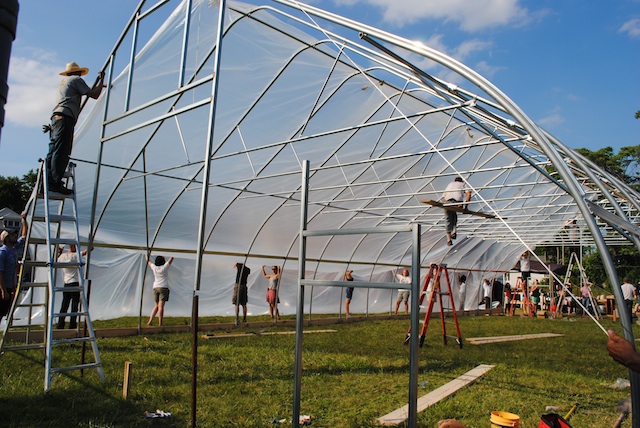
Cheers to the fact that living in a cold harsh northern clime doesn't preclude getting fresh veggies grown within driving distance of our wintry home. In a bid to boost local economies and reduce our reliance on the sunbelt and Mexico, hoop houses are rearing their heads around Washtenaw County.
Call it the 21st century version of the barn-raising, where volunteer groups of 15-30 strong are convening to put up a hoop house a day. In the latest campaign by hoop house champion and local-food breakfast salon
Selma Cafe, 15 of the structures were newly built in the 20 days between June 15 and Independence Day. Their locations include
Sunseed Farm and the
Tilian Farm Development Center, a new business incubator for farmers situated on a 150-acre plot in Ann Arbor Township.
These quonset-hut shaped structures, made of metal tubing and sheathed in plastic, are a key element of four-season agricultural production in the upper latitudes, says Jeff McCabe, co-founder of Selma Cafe. "People that are interested in creating a viable food system are thinking about ways to make it not just something that happens in the summertime, like a vacation of local food, but a year-round food economy that people can count on."
Summertime tomatoes, eggplant, and peppers thrive in the heat concentration, while hardy greens like spinach and brassicas sprout in winter, McCabe explains. Hoop houses moderate extreme winter temps, capturing the day's warmth and holding it overnight. "They're the difference between the ground being frozen and not," McCabe explains.
A hoop house averages about 3,000 square feet, costs from $9,000 to $15,000 to build, and can produce about $10,000-20,000 worth of agricultural product per year, says McCabe. There are currently at least a couple dozen hoop houses in Washtenaw County, he estimates. He'd like to see their numbers grow into the hundreds.
Some have been financed through the
Farmer Fund, a partnership between Selma Cafe and University Bank that offers 100% loan financing and the option to defer payments until the hoop houses are bearing crops, according to McCabe.
The food and beverage economy is valued at over a billion dollars a year in the county, according to the
10 Percent Washtenaw campaign.
"If we were going to re-localize 10% of that economy we'd be creating a $100-million food system in Washtenaw County that doesn't exist right now," McCabe notes. "Some of that would be restaurants, stores, and value-added products, but a big chunk of that – certainly tens of millions – could be food grown on new farms for both summer and winter production in Washtenaw County. That's what we're working on creating."
Sources: Jeff McCabe, co-founder of Selma Cafe; 10 Percent WashtenawWriter: Tanya Muzumdar
Enjoy this story?
Sign up for free solutions-based reporting in your inbox each week.